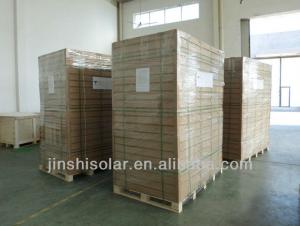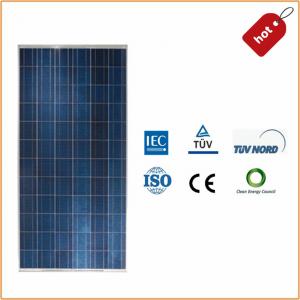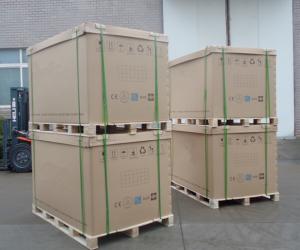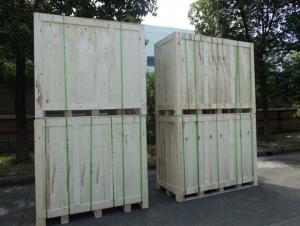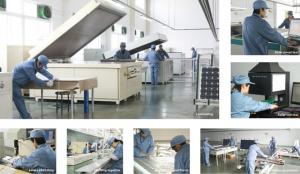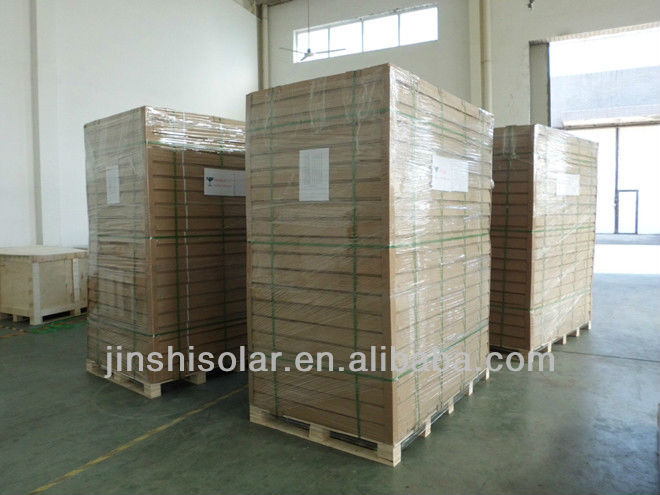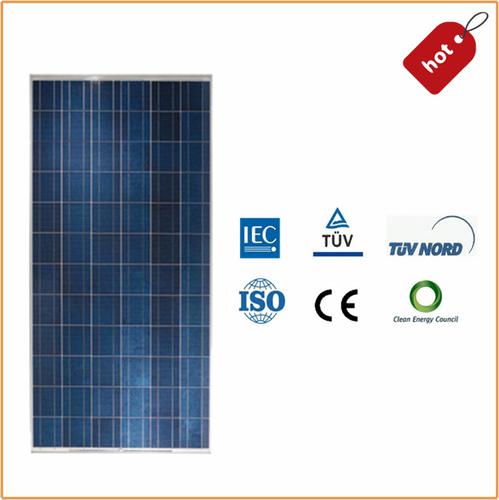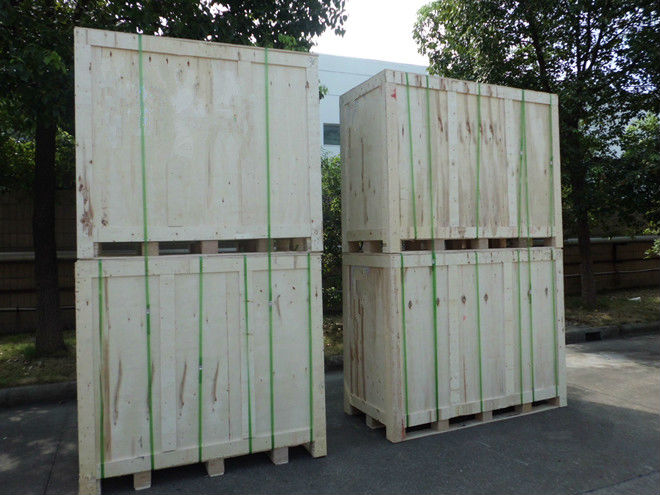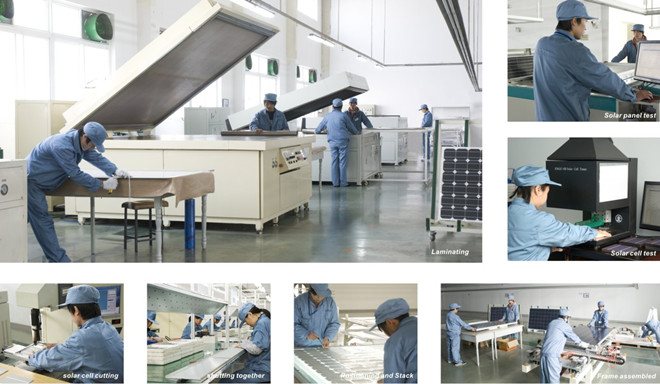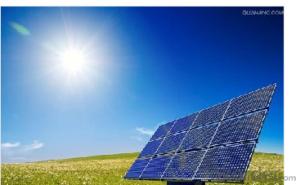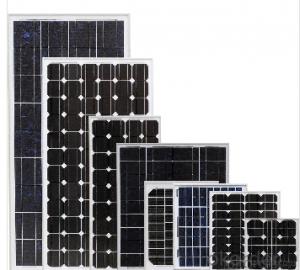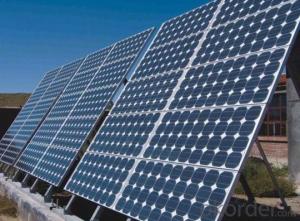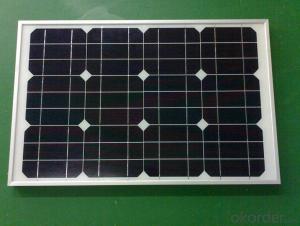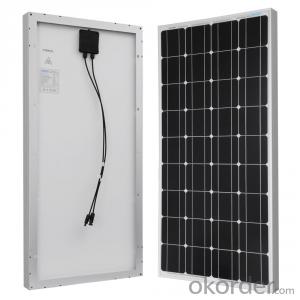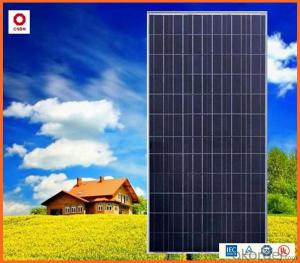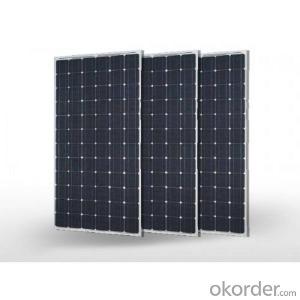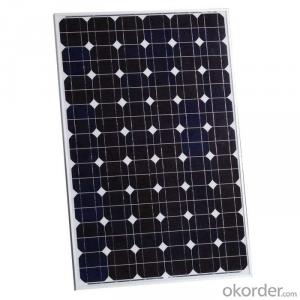Best Off Grid Solar Panels - 300W Solar Panel with TUV and UL Certification in China
- Loading Port:
- Ningbo
- Payment Terms:
- TT or LC
- Min Order Qty:
- -
- Supply Capability:
- 5000 watt/month
OKorder Service Pledge
OKorder Financial Service
You Might Also Like
Solar Panel 300w with Good Quality and Warranty
Mechanical Characteristics
Cell Type | Poly Crystalline 156×156mm(6 inch) |
No. of Cells | 72(6×12) |
Dimension | 1950×992×50mm |
Weight | 23kg |
Component element
Front Glass | 3.2mm, High Transmission, Low Iron, Tempered Glass |
Frame | Anodized Aluminum Alloy Type 6063-T5 |
Junction Box | IP 65 Rated (Black) |
Output Cables | TUV 1×4mm2, length:900mm |
Connector | MC4(UV resistance and self-locking/IP67) |
Encapsulation Material | EVA(0.50±0.03mm thickness) |
Back Foil | White TPT(0.32±0.03mm thickness) |
Fixing Adhesive | Silicone Sealant(White) |
Specifications
Module Type | 270P | 280P | 290P | 300P |
Maximum Power at STC (Pmax) | 270Wp | 280Wp | 290Wp | 300Wp |
Maximum Power Voltage (Vmp) | 36.21V | 36.38V | 36.50V | 36.60V |
Maximum Power Current (Imp) | 7.46A | 7.61A | 7.95A | 8.20A |
Open-circuit Voltage (Voc) | 43.50V | 43.70V | 43.95V | 44.30V |
Short-circuit Current (Isc) | 7.98A | 8.24A | 8.50A | 8.77A |
Cell Efficiency (%) | 15.7% | 16.3% | 16.9% | 17.2% |
Module Efficiency (%) | 14% | 14.5% | 15.0% | 15.5% |
Operating Temperature( °C ) | -40°C ~+90°C | |||
Maximum System Voltage(V) | DC 1000V(TUV) / DC600V(UL) | |||
Maximum Rated Current Series(A) | 15A | |||
Power Tolerance | 0~+3% | |||
Temperature Coefficients of Pmax | (-0.45±0.05)%/°C | |||
Temperature Coefficients of Voc | (0.05±0.01) %/°C | |||
Temperature Coefficients of Isc | (-0.35±0.02)%/°C | |||
NOTC(°C ) | (47±2)°C | |||
STC: Irradiance 1000W/M2 Module Temperature: 25°C AM=1.5
Warranty
Warranty | 10-year warranty on product material and processing technology |
Industry power output warranty: 90% in 12 years, 80% in 25 years |
Package

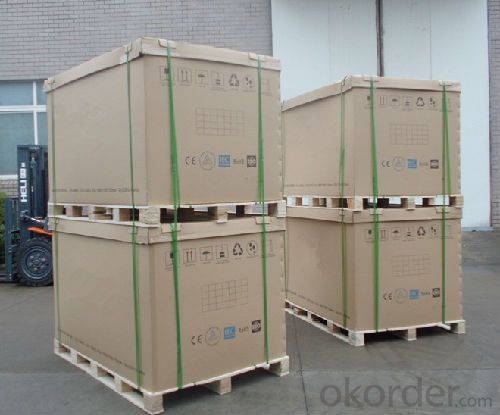
FAQ
I. Will you focus on the safety of the goods during transportation?
Yes, Safety of the cargo is the primary element that we would consider on transportation.
II..How would guarantee the quality will meet the requirements of your clients?
Before shipment, we will have inspection for each batch of goods.
III..What certificates do you have?
IEC,UL,TUV,CSA,etc.
IV..Can you do OEM according to clients’ requirements?
Yes, we have our own brand while we can provide OEM service.
- Q: ) what is absolutely needed to hook up a solar panel to grid tie, what permits and/or inspectors are needed?2) if we know how many KWH's we use per month, do we just divide by number of hours per month to find out average KW usage?3) what is an estimated ratio of DC to AC transformation/convertion @ 30 C?4) do the solar panel voltages have to be the same? what would happen if the voltage going into the house is greater/lower than that of the house's defualt voltage5) for added chance of getting 0 pts add some contrators that do business in ohio for installing solar panels or sell them
- The okorder The reference section has all the formulas you are looking for and there is a list of dealers by state, plus various state rebate information. Yes, you can hook up different panels to the same system. There are special controllers that regulate the voltage. I'm more of a hands on nuts and bolts guy so I can't help you with the formulas and engineering explanations. Another great place to get information is Home Power Magazine. You can get the issues online or in print. Thanks for going solar!
- Q: How do solar panels affect the property's green certification?
- Solar panels can positively impact a property's green certification by enhancing its sustainability and energy efficiency. The installation of solar panels reduces reliance on non-renewable energy sources, decreases carbon emissions, and promotes the use of clean energy. This aligns with the requirements of most green certification programs, which prioritize environmental responsibility and conservation. Therefore, incorporating solar panels can contribute significantly to a property's green certification and help demonstrate its commitment to sustainable practices.
- Q: How does the snow cover get removed from the panels?
- Green energy magically makes the snow transparent. The more I learn about solar and wind, particularly selling excess power back to the utility, the less sense it makes. You'll have noticed, perhaps, that there was no way to store the power from the panels for when it's really needed.
- Q: Can solar panels be used for powering traffic lights?
- Yes, solar panels can be used to power traffic lights. Solar panels convert sunlight into electricity, which can be used to power various devices, including traffic lights. This renewable energy source can provide a sustainable and reliable power supply for traffic lights, reducing dependence on traditional electricity sources.
- Q: Are there government incentives for installing solar panels?
- Yes, there are government incentives for installing solar panels. Many countries and states offer financial incentives such as tax credits, rebates, grants, and feed-in tariffs to encourage the adoption of solar energy. These incentives aim to make solar panel installation more affordable and help individuals and businesses transition to renewable energy sources.
- Q: Can solar panels be damaged by birds or rodents?
- Yes, solar panels can be damaged by birds or rodents. Birds may build nests underneath the panels or perch on them, causing potential damage to the wiring or scratching the surface. Rodents like squirrels or rats can chew on the wires, leading to electrical issues. Therefore, it is important to take preventive measures such as installing bird deterrents or protective barriers to minimize the risks posed by these animals.
- Q: Can solar panels be installed on concert venues or music festivals?
- Yes, solar panels can be installed on concert venues or music festivals. In fact, many venues and festivals are now embracing renewable energy solutions like solar panels to reduce their carbon footprint and promote sustainability. Solar panels can be installed on rooftops, parking lots, or open spaces, providing a clean and renewable source of energy to power stages, lighting, and other electrical needs. This not only helps to reduce greenhouse gas emissions, but also showcases a commitment to environmental responsibility in the entertainment industry.
- Q: Can solar panels be used in areas with high levels of UV radiation?
- Yes, solar panels can be used in areas with high levels of UV radiation. In fact, solar panels are designed to withstand and harness UV radiation from the sun. However, it is important to note that excessive UV exposure can cause some degradation over time, so proper maintenance and monitoring are necessary to ensure optimal performance and longevity of the solar panels.
- Q: ok so when a solar panel is marked as a certain wattage dose that mean it makes that much in a day in an hour or constant, dose it still work at night or what ? is it worth it or is it more of a pain? can some one tell me what all the watts and volts mean ?? and can some one tell me what a kilowhat is in refrence to some thing i understand like howmany loads of laundey can you do wt a watt? i need help understanding this stuff?
- Create okorder /
- Q: Can solar panels be installed on a school or educational institution?
- Yes, solar panels can be installed on a school or educational institution. In fact, many educational institutions are now adopting solar energy as a sustainable and cost-effective solution to meet their electricity needs. Installing solar panels not only reduces carbon footprint and saves on energy costs but also provides an opportunity for students to learn about renewable energy and sustainable practices.
Send your message to us
Best Off Grid Solar Panels - 300W Solar Panel with TUV and UL Certification in China
- Loading Port:
- Ningbo
- Payment Terms:
- TT or LC
- Min Order Qty:
- -
- Supply Capability:
- 5000 watt/month
OKorder Service Pledge
OKorder Financial Service
Similar products
Hot products
Hot Searches
Related keywords
